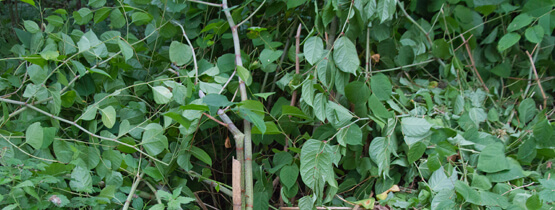The term "invasive species" may not sound very threatening, but these invaders, both large and small, can and do have devastating effects on wildlife and communities across the world.

Invasive species are one of the most threatening problems to native wildlife, with approximately 42% of endangered species at risk as a result of invasive species. Endangered species aren't the only things that are at risk due to invasive species, however, with economies and human health also susceptible to feel the effects. The impact that invasive species have on our natural ecosystems and economy cost billions each and every year, with many of our recreational, agricultural and commercial activities heavily reliant on healthy native ecosystems.
What is an invasive species?
An invasive species can be any sort of living organism such as an amphibian, insect, fish, bacteria, fungus or plant. Even organism's seeds or eggs can be classed as an invasive species if they aren't native to a particular ecosystem and cause harm. Harm can be caused to either the environment, human health or the economy. Species that also grow and reproduce quickly, spread aggressively and carry the threat of causing harm are labelled as 'invasive'. An important note to remember is that an invasive species doesn't have to come from another country in order for it to be classed as invasive. It only needs to be non-native to the area that it is found in.
How do invasive species spread?
Invasive species are primarily spread as a result of human activities, often by mistake. People, and the goods that they use, are able to travel around the world very quickly and often carry with them uninvited species. Ships can transport aquatic organisms within their ballast water, while smaller boats may carry them on their propellers. Insects can find their way into wood, crates and pallets that are shipped around the world. Some ornamental plants can escape into the wild and become invasive, just as Japanese knotweed did. Some invasive species can also be intentionally or mistakenly released pet, such as Burmese pythons in the Everglades!
Impact on native wildlife
As is the case with the Burmese pythons in Florida, invasive species can cause harm to native wildlife. When a new and aggressive species is brought into an ecosystem, it may not have any natural predators or controls to contend with, ultimately allowing them to roam free and behave in any way that they want, including breeding. Native wildlife may not have developed any defences against the newcomer, or they may simply not be able to compete with a species that has no predators.
The direct threats that come with an invasive species include out-competing native species for food and other resources, preying on native species, causing or transporting diseases and preventing native species from reproducing. There are also indirect threats related to any invasive species such as changing the food web in an ecosystem by replacing or damaging native food sources, as we've seen with Japanese beetles in North America becoming a major pest for farmers growing crops such as grapes. They can also have an effect on the diversity of species that are important habitat for native wildlife. Aggressive plant species such as Japanese knotweed can quickly replace a diverse ecosystem with a monoculture of just knotweed. Additionally, some invasive species are capable of changing the conditions in an ecosystem, such as altering soil chemistry.
As well as having a devastating impact on natural wildlife, invasive species can affect local infrastructure and economies. Read how Japanese knotweed ravaged a housing estate in our blog below.
Japanese Knotweed Ravages Housing Estate >
If you have spotted an invasive species on or near your property, such as Japanese knotweed, you can get in touch with the team here at Taylor Total Weed Control today to gain expert advice and even treatment. Call us on 02920 397 554 or email us at sales@talortwc.co.uk.
